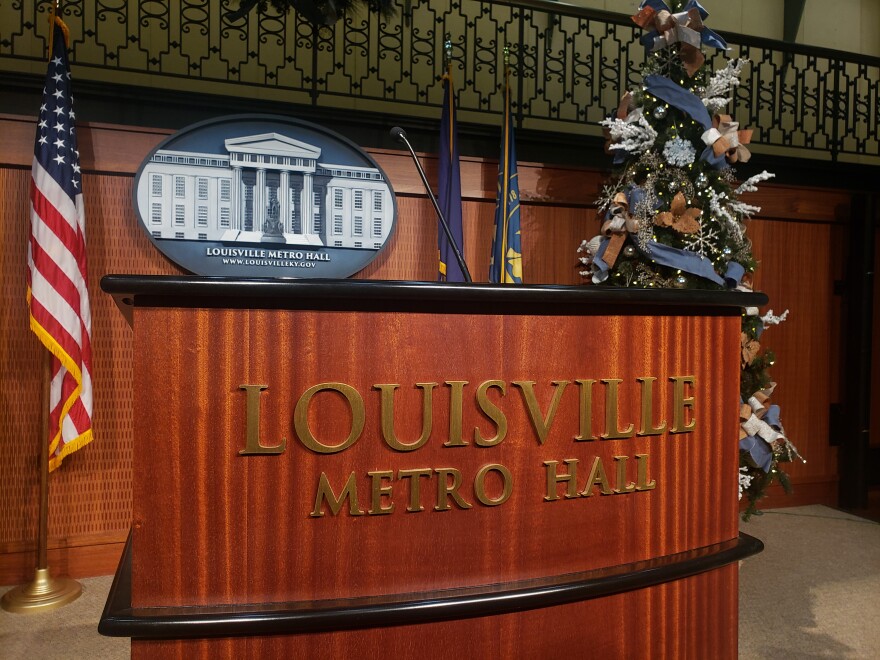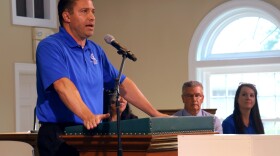Metro Council members considering a mid-year surplus spending plan raised concerns about its pragmatism during a special budget committee meeting Tuesday afternoon.
The plan, which Mayor Greg Fischer revealed on Monday, called for more than $5 million in capital and operating budget adjustments that would fund a range of expenditures, from equipment purchases for clean-up tasks, including the mowing of vacant lots, to funding for Kentucky Science Center.
This spending would come from $26 million carried over from the previous fiscal year, which Louisville chief financial officer Daniel Frockt said was enabled by federal funding via the CARES Act due to the coronavirus pandemic. That will run out on Dec. 30.
Council members questioned whether it is smart to increase staffing in some areas, and whether the Kentucky Science Center is the right place to allocate $750,000. They also asked about potential pension pressures and the uncertainty of further federal funding.
Brent Ackerson (D-26), who serves on the committee, suggested increasing Public Works’ spending may not be the right move. Fischer’s proposal includes $1 million for community clean-ups, street sweeping and graffiti removal, $583,700 to Codes and Regulations to mow vacant lots and remove graffiti, and $1.7 million in capital expenditures for equipment used for clean-up efforts, including mowing vacant lots.
Ackerson called the desire to clean up the city “admirable,” but warned about “financial troubles that could be coming down the pike very quickly.”
Scott Reed (R-16), another committee member, said he felt the proposal was rushed, and suggested waiting to pass any spending changes until late January to see what type of assistance might come from the federal government, as well as any impact from vaccine deployment.
“We should pause a little bit, get a better plan,” he said. “Everything just seems really rushed here, and what we don’t want to do is write checks that we can’t cash.”
Frockt, the CFO, said the administration’s concern is that deferring some costs could make addressing those issues more expensive in the future.
Another future concern on council members’ minds is the city’s rising pension burden. The 12% annual increase expected each fiscal year was waived this fiscal year due to an action by the General Assembly. As of now, that increase is expected to apply next fiscal year, which starts in July 2021.
Bill Hollander (D-9), the budget committee chair, said he believes the Kentucky League of Cities will appeal to the General Assembly for more pension relief for cities.
“We can't count on that kind of relief from the General Assembly, and unless we get it, we will be looking at 12%,” Hollander said.
Earlier Tuesday, Fischer addressed the spending plan. His administration created it in partnership with Hollander, council president David James (D-6), Keisha Dorsey (D-3), Barbara Sexton Smith (D-4) and Markus Winkler (D-17).
“As we look forward, and we look at our immediate challenges we have right now, with some additional resources in those areas, we can do a better job for the city,” Fischer said.
Despite their concerns, some council members said measures that would support efforts to address homelessness and gun violence could be worth funding.
Two ordinances related to this spending will be read into the record on Thursday, at the full council’s last meeting of the year, then discussed again during a special budget meeting likely later this month. Council members will have the opportunity to change or amend the spending allocations before passing any legislation.
Also on Thursday, the council will consider an ordinance to use $10 million of funds carried forward from last fiscal year to provide utility assistance to Louisville residents.
In addition to funding for the Kentucky Science Center and city clean-up, here are the other proposed spending allocations:
- $600,000 for the Office of Resilience and Community Services for a homelessness mobile response team
- $250,000 to address “areas of need in homeless assistance efforts”
- $350,000 for the Office for Safe and Healthy Neighborhoods for hiring youth outreach specialists and funding the Group Violence Initiative, announced in October






